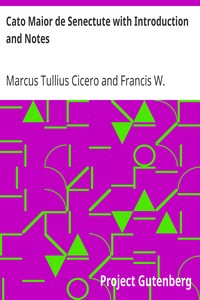Cato Maior de Senectute with Introduction and Notes by Marcus Tullius Cicero
"Cato Maior de Senectute" by Marcus Tullius Cicero is a philosophical treatise written in the mid-1st century BC. This work presents a dialogue centered around the topic of aging, specifically addressing the common fears and misconceptions about old age through the voice of Cato the Elder. It aims to provide wisdom and comfort regarding the journey into old age, advocating a perspective that cherishes the virtues and joys that can accompany this
stage of life. At the start of the text, Cicero expresses his intention to write about aging to bring solace to his friend Atticus, who, like Cicero himself, is facing the challenges that come with advancing years. Through a dialogue featuring Cato, Scipio, and Laelius, Cato presents powerful arguments against common criticisms of old age, claiming that it can be a period of dignity, wisdom, and fulfillment. He references respected figures of history and philosophy to emphasize that age does not preclude one from active contributions and meaningful enjoyment of life. Cato's philosophy implies that maintaining the right attitude can lead to a rewarding experience in old age, countering the narrative that senescence is exclusively burdensome or negative. (This is an automatically generated summary.)
Read or download for free
| How to read | Url | Size | |||
|---|---|---|---|---|---|
| Read now! | https://www.gutenberg.org/ebooks/14945.html.images | 441 kB | |||
| EPUB3 (E-readers incl. Send-to-Kindle) | https://www.gutenberg.org/ebooks/14945.epub3.images | 265 kB | |||
| EPUB (older E-readers) | https://www.gutenberg.org/ebooks/14945.epub.images | 270 kB | |||
| EPUB (no images, older E-readers) | https://www.gutenberg.org/ebooks/14945.epub.noimages | 239 kB | |||
| Kindle | https://www.gutenberg.org/ebooks/14945.kf8.images | 600 kB | |||
| older Kindles | https://www.gutenberg.org/ebooks/14945.kindle.images | 513 kB | |||
| Plain Text UTF-8 | https://www.gutenberg.org/ebooks/14945.txt.utf-8 | 346 kB | |||
| Download HTML (zip) | https://www.gutenberg.org/cache/epub/14945/pg14945-h.zip | 256 kB | |||
| There may be more files related to this item. | |||||
Similar Books
About this eBook
| Author | Cicero, Marcus Tullius, 107 BCE-44 BCE |
|---|---|
| Annotator | Reid, James S. (James Smith), 1846-1926 |
| Editor | Kelsey, Francis W. (Francis Willey), 1858-1927 |
| Title | Cato Maior de Senectute with Introduction and Notes |
| Note | Reading ease score: 66.1 (8th & 9th grade). Neither easy nor difficult to read. |
| Note | Wikipedia page about this book: https://en.wikipedia.org/wiki/Cato_Maior_de_Senectute |
| Credits |
Produced by Ted Garvin, Keith Edkins and the Online Distributed Proofreading Team. |
| Language | English |
| Language | Latin |
| LoC Class | PA: Language and Literatures: Classical Languages and Literature |
| Subject | Old age -- Early works to 1800 |
| Category | Text |
| EBook-No. | 14945 |
| Release Date | Feb 7, 2005 |
| Most Recently Updated | Dec 19, 2020 |
| Copyright Status | Public domain in the USA. |
| Downloads | 464 downloads in the last 30 days. |
| Project Gutenberg eBooks are always free! | |

